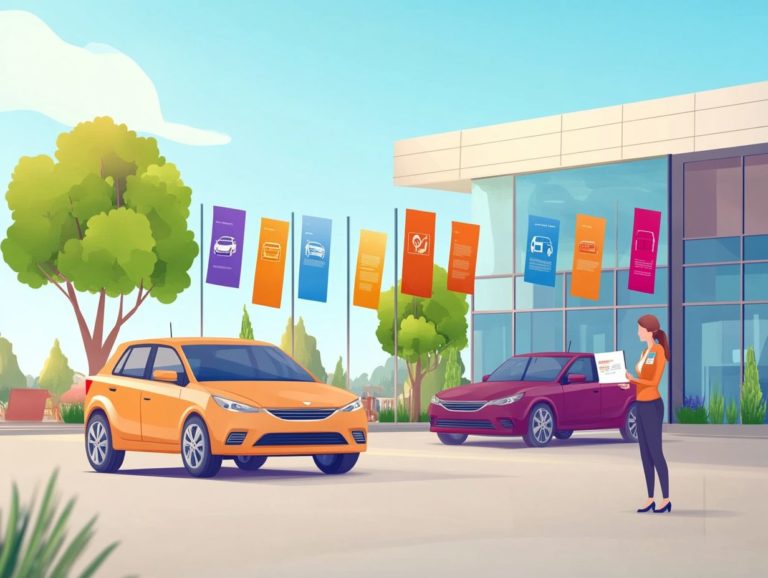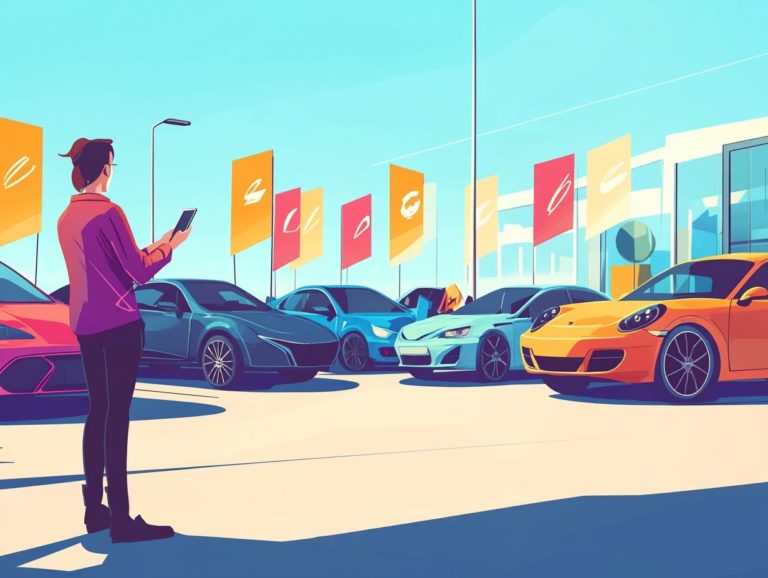The Future of New Car Buying: Trends to Watch
The car buying landscape is evolving at an astonishing pace.
Technological advancements and changing consumer preferences are driving this change.
You now have a wealth of options at your fingertips, from the classic dealership experience to the ease of online purchases and the emerging allure of monthly car subscriptions, which let you drive a car for a set period without owning it. Electric and self-driving cars that require little to no human intervention are not just buzzwords; they re reshaping your expectations of what a car can be.
Ride-sharing and car-sharing services are changing how you think about owning a vehicle.
Explore these trends now and see the exciting changes in the industry unfold!
Contents
Key Takeaways:
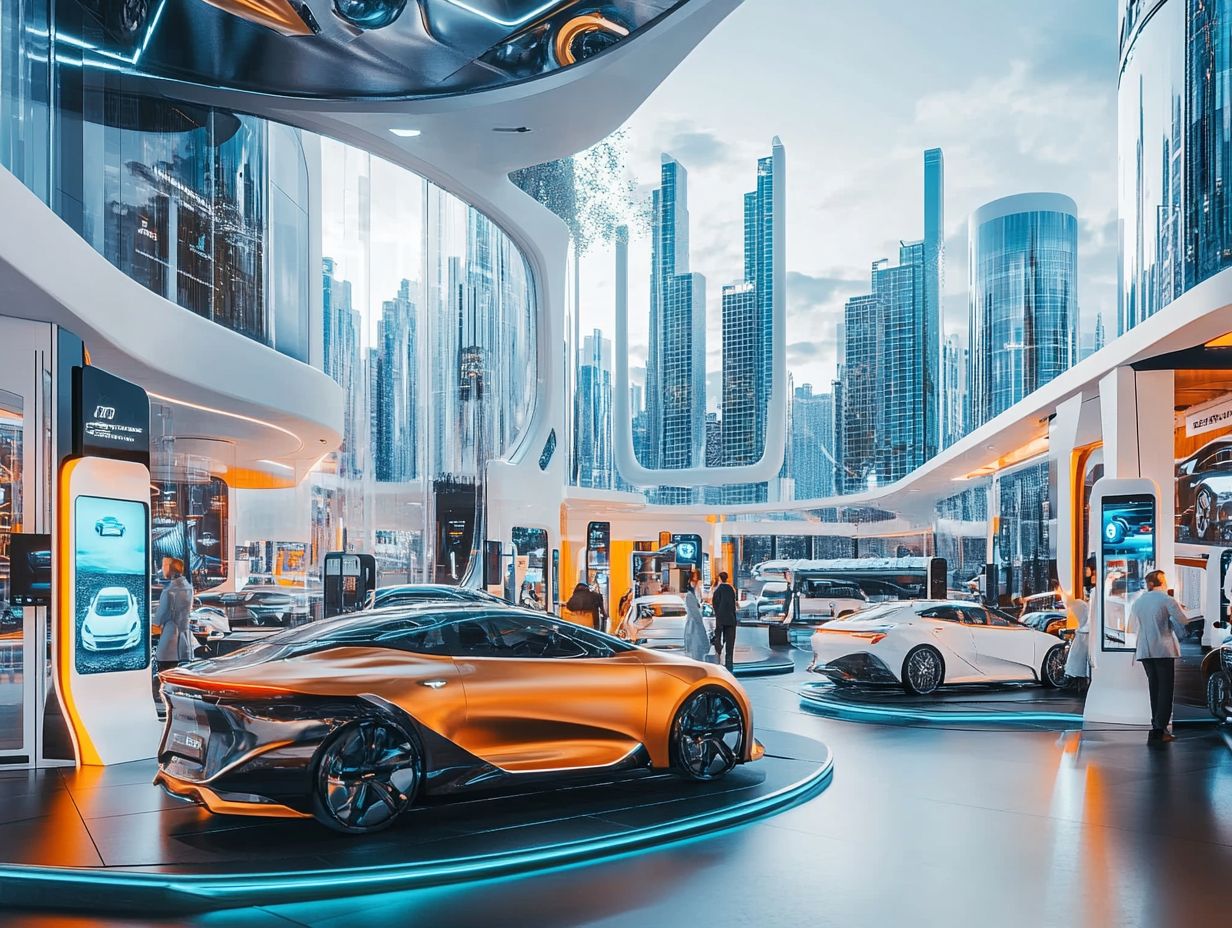
The rise of online car buying has made the process more convenient and transparent for consumers, but potential drawbacks such as lack of physical inspection and test driving should be carefully considered. Subscription-based car ownership is a growing trend, offering flexibility and convenience for consumers, but it may not be a cost-effective option for those who prefer long-term ownership. The future of car buying is electric and autonomous. As technology continues to advance, it is important for consumers to stay informed and adapt to these changes in the industry.
Overview of Traditional Car Buying Process
The traditional car buying process has changed a lot recently. Factors like shifting consumer expectations and inventory challenges have changed how you buy cars.
Gone are the days when buyers would hop between multiple dealerships, relying on face-to-face interactions and print ads. That approach is becoming a relic as digital marketing strategies and shifts in consumer behavior pull the entire process into the online realm. Dealerships are now rethinking their strategies to align with the preferences of today s savvy buyers.
These days, when you begin your search for a new vehicle, it usually starts with thorough online research. You’ll explore various models, compare prices, and dive into reviews from other consumers. This essential first step equips you with insights and helps narrow down your options before you even set foot in a dealership.
Once you re ready to visit, the experience has become much more streamlined. Many buyers now schedule appointments to avoid crowds, and virtual tours allow you to assess a vehicle’s features from the comfort of your home.
Financing options have also evolved to meet your needs. You can use online tools to calculate monthly payments, compare interest rates, and even pre-qualify for loans. This makes your financing decisions more informed and transparent.
The negotiation phase has embraced the digital age too. Many buyers now engage in price negotiations via email or chat, a trend that has been accelerated by the pandemic’s emphasis on convenience and efficiency, all while navigating inventory issues and heightened expectations.
Online Car Buying
Online car buying has changed how you shop for cars. Now, you can research, compare, and interact with ads easily all of which fundamentally reshape your buying journey.
This shift aligns seamlessly with your expectations, especially if you belong to the Gen Z demographic. This new model provides a streamlined approach to purchasing vehicles, eliminating many of the traditional hurdles you might encounter when shopping for a car.
It caters to your desire for convenience and accessibility in the automotive industry.
Benefits and Drawbacks
The landscape of online car buying has both benefits and drawbacks. You need to navigate these carefully to ensure a positive experience.
This modern method offers greater convenience. You can compare prices effectively and receive tailored recommendations.
Shopping from home saves you time and money. You can compare prices without the pressure of a salesperson.
Many online platforms provide tools to customize options based on your needs. However, beware of scams and fraudulent listings that could lead to financial loss.
Not being able to inspect a vehicle before buying can lead to disappointment. Finding a balance between technology and traditional methods is essential.
Subscription-Based Car Ownership
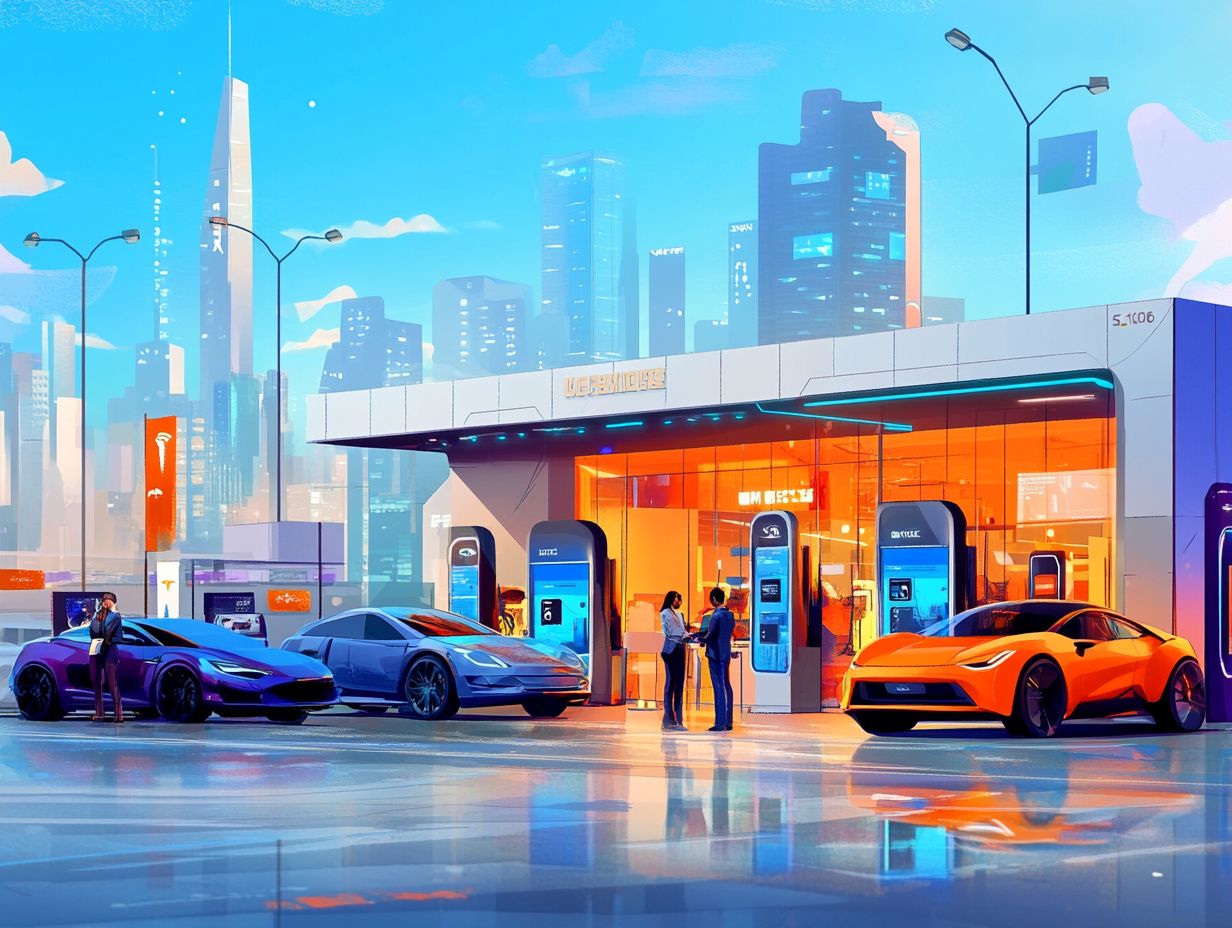
Subscription-based car ownership is a great alternative in the automotive world. It meets your changing expectations and addresses inventory issues faced by traditional ownership models.
This approach gives you the flexibility to access a variety of vehicles. You avoid the long-term commitments and responsibilities of ownership.
Exploring the New Model
The subscription-based model reflects significant changes in the automotive industry. It aligns perfectly with your preferences and the latest vehicle technologies that emphasize ease of use.
This model is ideal for those seeking short-term solutions. Younger consumers, like yourself, often prefer flexibility over traditional car ownership.
Subscription services now offer various vehicles, from electric cars to luxury SUVs. This trend supports the emphasis on sustainability and modern technology.
Companies are enhancing your experience with advanced features like in-car connectivity and self-driving capabilities. These innovations fulfill your demand for modern automotive solutions.
The response to these services has been overwhelmingly positive. There s clear excitement for this new way to access vehicles.
Electric and Autonomous Vehicles
Electric and self-driving vehicles are the height of innovation in the automotive world. They are reshaping how you think about vehicle technology and transportation s future.
Pioneers like Tesla and Waymo are driving this momentum toward a sustainable future. Demand for electric vehicles is rising due to environmental concerns and advancements in technology.
This evolution is set to redefine how we move for generations. It offers a look into a future where transportation is both eco-friendly and smart.
The Future of Car Technology
Car technology is about to change significantly with electric vehicles and self-driving technology taking center stage. As AI tools enhance features, your expectations are reshaping innovations.
Manufacturers are investing heavily in new technologies. This integration will redefine your driving experience and influence your purchasing choices.
This evolution will boost efficiency and meet the demand for sustainability. Smart features like predictive maintenance and real-time traffic updates will make cars interconnected, offering convenience and safety.
AI in self-driving cars allows vehicles to learn from their surroundings. This means you can expect a seamless driving experience focused on safety and personalization.
The Impact of Ride-Sharing and Car-Sharing Services
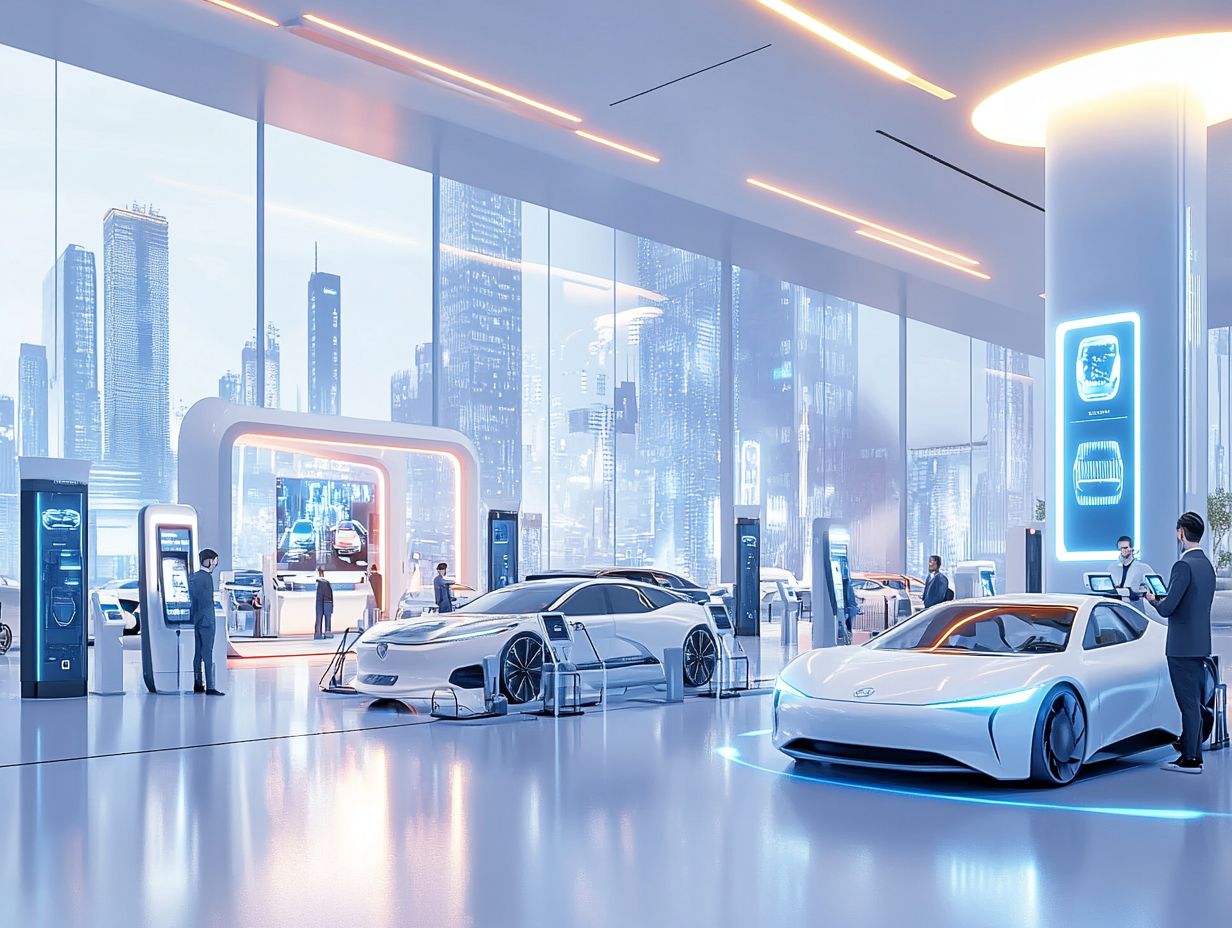
The influence of ride-sharing and car-sharing services is transforming consumer behaviors in the automotive landscape, particularly in the aftermath of the pandemic.
Micromobility solutions have become increasingly attractive to urban dwellers who prioritize efficient and cost-effective transportation options.
These services are reshaping how you think about mobility and transportation altogether. With their emphasis on flexibility and convenience, they prompt a reevaluation of what personal mobility really means in today s world.
Changing Consumer Behaviors
Changing consumer behaviors are making quite a splash in the automotive industry, especially with the rise of ride-sharing services and the increasing reliance on online research. This is particularly true for Gen Z consumers, who value flexibility and sustainability.
This shift is not just a trend; it reflects deeper societal changes and preferences. Automotive marketers and manufacturers are rethinking their strategies for engaging this new generation of car buyers.
As preferences shift towards shared mobility, purchasing decisions are evolving too. It s becoming less about owning a car and more about the experiences that come with it.
Companies are focusing on eco-friendly technologies and innovative ride-sharing solutions that align with the values of an environmentally conscious audience. This transition means traditional advertising methods are transforming, placing a premium on digital engagement and sustainability messaging to connect with potential customers.
The automotive sector is witnessing a growing demand for electric vehicles and hybrid models, as consumers actively seek to reduce their carbon footprint. This demand is shaping industry trends, pushing towards more sustainable practices and products that resonate with today s conscientious buyers.
The Role of Artificial Intelligence in Car Buying
Artificial Intelligence is revolutionizing the car buying experience by enhancing personalization through sophisticated, data-driven strategies that refine your journey and streamline your decision-making process.
By harnessing AI tools, dealerships and manufacturers can craft targeted marketing campaigns, optimize inventory management, and elevate customer service. This ultimately results in a more satisfying purchasing experience for you.
How AI is Shaping the Industry
AI is revolutionizing the automotive industry. It changes consumer behavior and enhances operational efficiency through advanced data analysis and prediction techniques.
This technology gives you the power to gain deeper insights into your customers. You can forecast demand accurately and improve the car buying experience.
By harnessing AI, you can create personalized interactions with buyers. Tailoring your marketing messages to individual preferences boosts customer satisfaction and builds brand loyalty.
AI is also crucial for optimizing inventory management. It helps predict which car models will be popular, allowing for better resource allocation and reduced costs.
The industry is evolving rapidly. Soon, AI strategies will transform your marketing, driving targeted campaigns that resonate with consumers.
Frequently Asked Questions
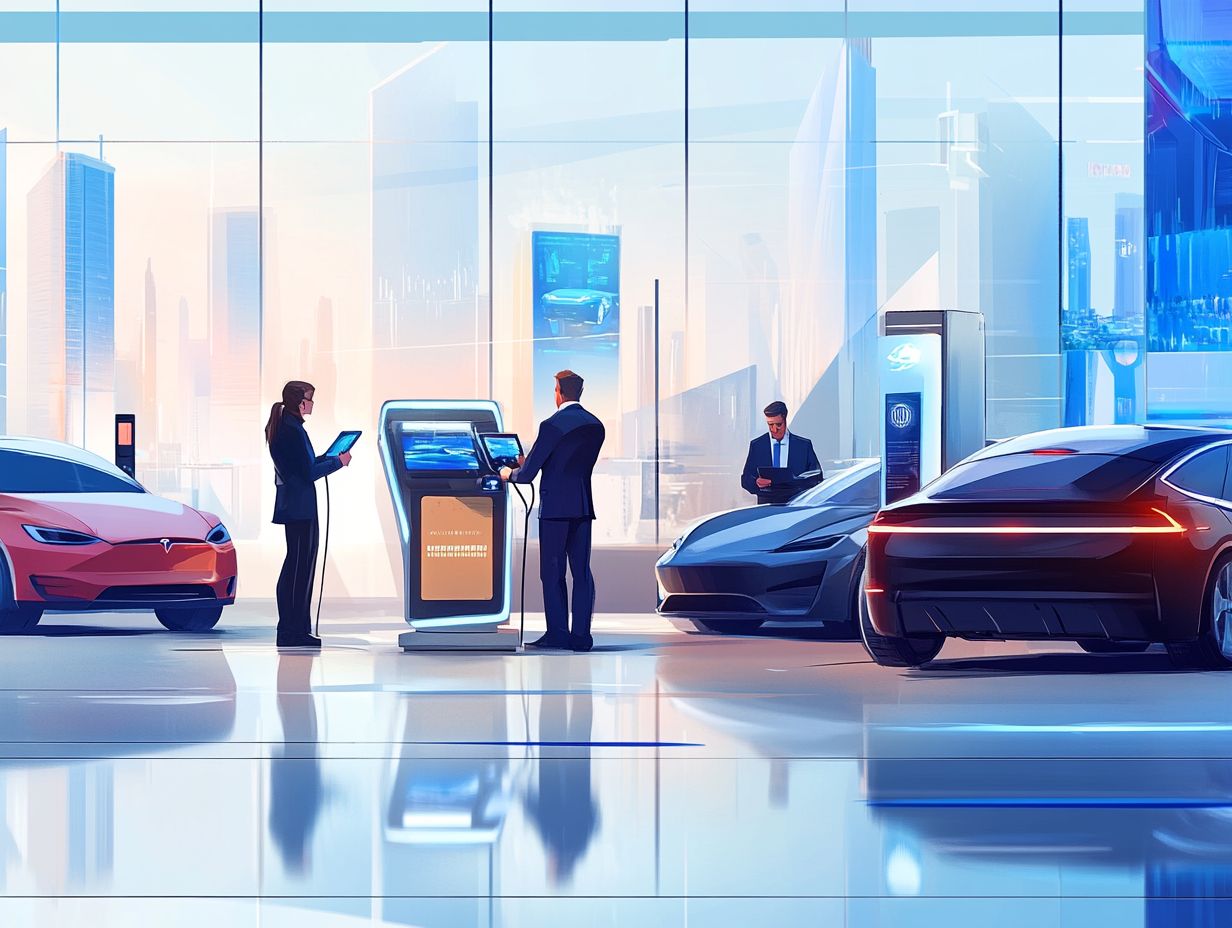
What s changing in new car buying?
Emerging trends include online shopping, subscription services, and electric and self-driving vehicles.
Will traditional dealerships still matter?
Yes, many consumers still prefer in-person experiences. Dealerships are adapting to offer personalized and convenient services.
How will tech advancements affect car buying?
Innovations like virtual reality and AI will enhance the car buying journey. They will simplify research and customization for customers.
What impact will electric and autonomous vehicles have?
As these vehicles become more accessible, we expect a market shift. Customers will consider new factors like charging options and self-driving features.
How will subscriptions change car ownership?
Subscription services will alter traditional car ownership. Customers can access various vehicles without long-term commitments.
What about sustainability?
Sustainability will become increasingly important as awareness of environmental impacts grows. Expect more eco-friendly options and sustainable manufacturing practices.


